A Complete Guide to the Square Experience
Are you interested in working at Square? Here's what you should know.
Square employees tend to hold the company in high regard. Upon first glance, it looks like they have a lot of reasons to: Square boasts competitive benefits, amazing perks, a vibrant culture, and a solid work-life balance.
Past all the glowing reviews, is Square the right place for you? We're breaking down the company culture, benefits, and interview process to help make your decision easier.
What is Square?
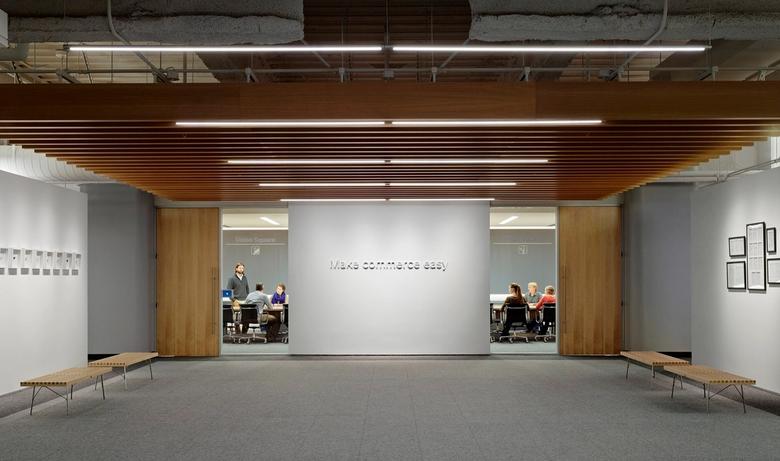
Photo credit: ArchDaily
Square has leveled the playing field for small businesses. Since its creation in 2009, Square has sold small card readers that connect to mobile devices. These readers allow entrepreneurs to charge customers for their services without the fancy equipment. Today, Square sells a variety of tools, from registers and chip readers to team management and site-building software.
The startup was established by cofounders Jack Dorsey and Jim McKelvey, and it has expanded rapidly throughout the past 12 years. Square has offices in major US cities, from its San Francisco headquarters to its smaller New York office.
Square Culture & Work Environment
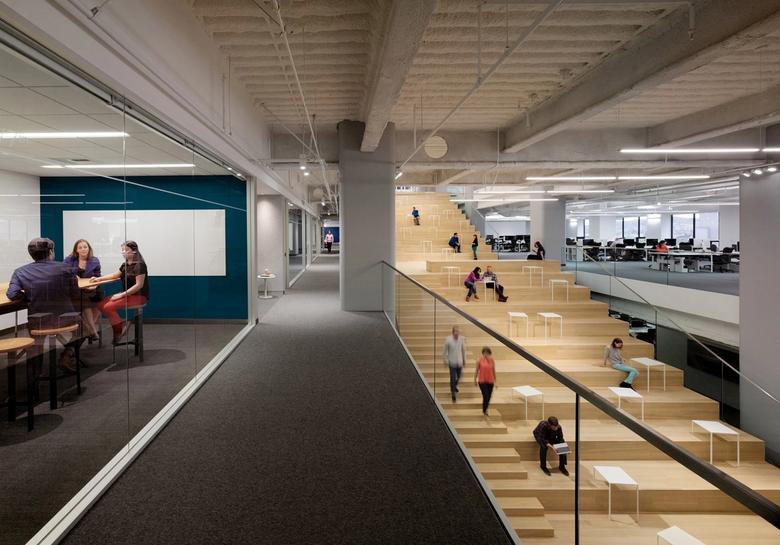
Photo credit: Office Snapshots
Community-Oriented Company Culture
Square team members have overwhelmingly positive views about the company culture, with favorable opinions about flexibility, advancement opportunities, and the people. A strong sense of community and inclusivity are important features of Square's culture.
One Square employee on Quora backed up this view. They pointed out that most coworkers are happy with their work and described a collaborative culture:
"We're constantly collaborating. Because we have a lot of internal transparency in the company, everyone has the potential to impact many facets of our work -- that means if you're working on the finance team, your feedback on our hardware design is still asked for and listened to."
Promoting Diversity
Square aims to create a diverse and inclusive work environment where employees feel valued and heard. To promote this goal, Square has 14 resource groups that aim to empower diverse communities within the company including Black Squares Association, Latinx, Squeers, and Women at Square.
Square has implemented measures to ensure fairness in promotion and compensation:
- Fairness in promotions: The Human Resources team devised a Fair and Square checklist to identify potential biases that may arise when considering employees for promotion. This checklist is now used throughout the entire company during the promotion cycle.
- Fairness in compensation: In regard to compensation fairness, Square's People Analytics team audits all compensation changes to assess pay equity across race, gender, and age groups.
Most of Square's pay gaps exist among higher-paying roles because representation within these roles is unequal. In an effort to combat this inequality Square initiated its RISE program, which requires that at least one underrepresented minority or woman receive a final stage interview for level 6 roles and higher. The RISE program increased the number of women included throughout the hiring process, but produced inconclusive results with underrepresented minorities.
To improve the RISE program, Square has expanded it to level 4 roles and higher. In business roles, the program now focuses solely on increasing the representation of underrepresented minorities throughout the hiring process.
Work-Life Balance
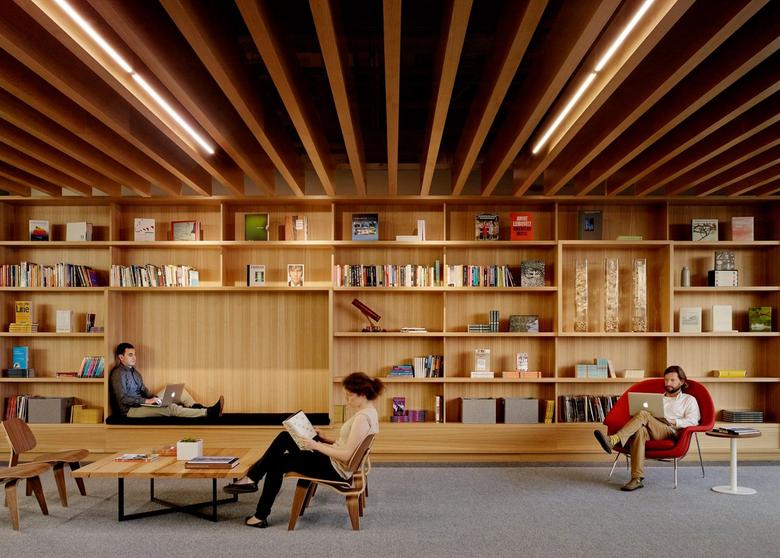
Photo credit: Office Snapshots
At any growing startup, employees tend to dedicate more hours than would be typical of an established business. Square has received negative attention in the past for this very reason. One employee on Quora explained:
"Most employees work intensely for more than 10 hours a day...there's a culture of workaholism and significant peer pressure to work until 'it's done.'"
This experience with Square was not unique in the early 2010s. Some passionate employees didn't mind the long hours, but most reported burnout and an intense culture with high expectations. Needless to say, the work-life balance leaned in the direction of more work than leisure.
Square has grown tremendously and work-life balance seems to have changed in the process. Within the last year, most employees report being able to work whenever is best for them, even if those hours fall outside of the traditional work schedule.
One employee on Blind reports that Square does not pressure its employees to work extra hours these days:
"Culturally square is extremely flexible and accommodating. We’re results-oriented rather than forced by time or hours."
Square Benefits Package
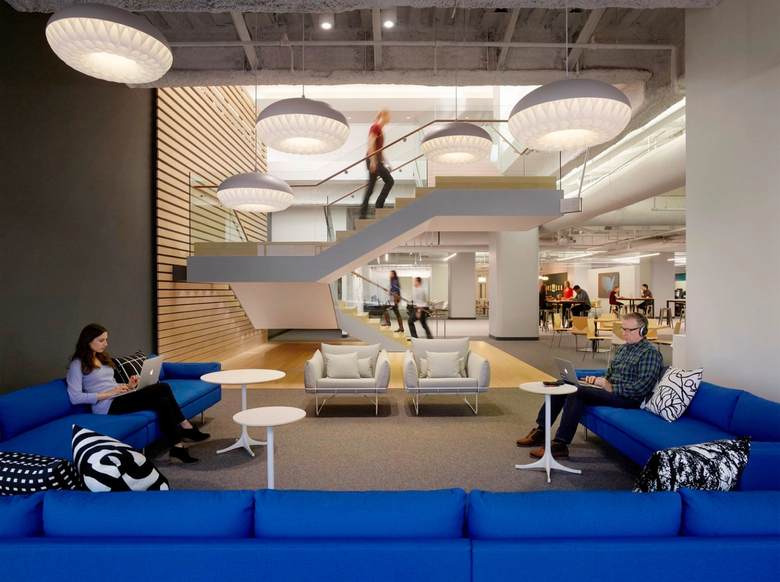
Photo credit: Office Snapshots
Competitive Salary
According to our data, which updates in real-time, the average salary at Square is $256,517; the average base pay is $141,200, the average equity grant is $111,768, and the average signing bonus is $23,750.
Of course, salaries vary with the type and level of the role. Software engineers, for example, are among the highest-paid employees at Square with salaries in the $200,000/300,000 range.
Top-Notch Health Benefits
Square employees have very favorable views about the company's benefits package, noting that it is among the best in the tech world. Square offers multiple health, dental, and vision insurance plans for its employees to choose from, with both high deductible and low deductible plans. Square also contributes $2,000 a year to each employee's Health Savings Account.
Other notable health benefits include membership with Lyra, a network of mental health care providers. Its Employee Assistance Program offers services to team members dealing with personal and work-related issues.
Amazing PTO Policy
Yes, take unlimited PTO
Unlimited paid time off, sick days, and holidays are available to all Square employees. According to many reviews, the true flexibility of this policy depends on your team: some managers are more willing to grant time off than others.
Commitment to family
Square's parental leave policy is considered one of the best in the nation. The company offers new parents, including birth, adoptive, and foster 16 weeks of PTO.
Square also grants family leave to care for a sick spouse, child, or qualifying parent. Their commitment to family doesn't stop there: Square offers up to $7000 for both adoption and fertility assistance.
Comprehensive Financial Benefits
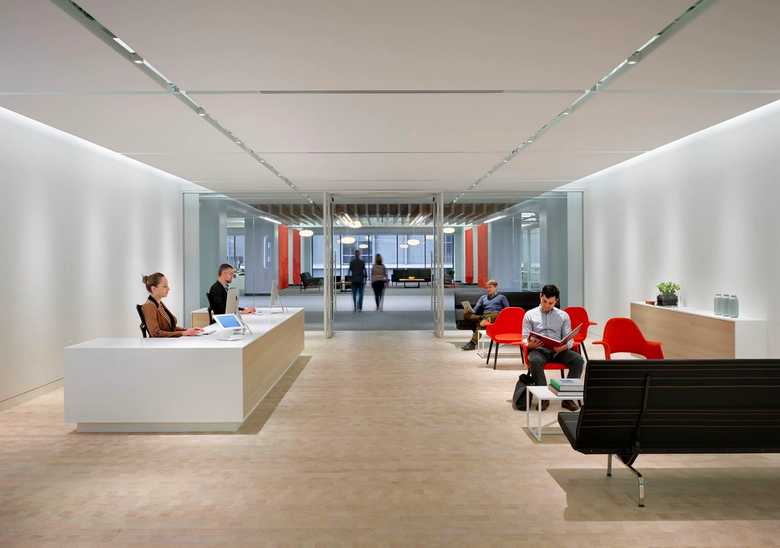
Photo credit: Office Snapshots
Square's equity incentives program offers multiple options to benefit from the company's stocks. Square grants many of its employees restricted stock units, or RSUs, that vest over 4 years, with 25% vesting each year. All full-time employees can reap the benefits of Square's Employee Stock Purchase Plan in which they can purchase stock at a 15% discount.
Square offers a competitive 401k plan through Fidelity, which matches contributions up to $5,000.
Other financial benefits include life insurance, short and long-term disability insurance, and death benefits. Short-term disability recipients get a top-up from Square in which they collect 100% of their salary for up to 13 weeks.
Extra Perks You'll Love
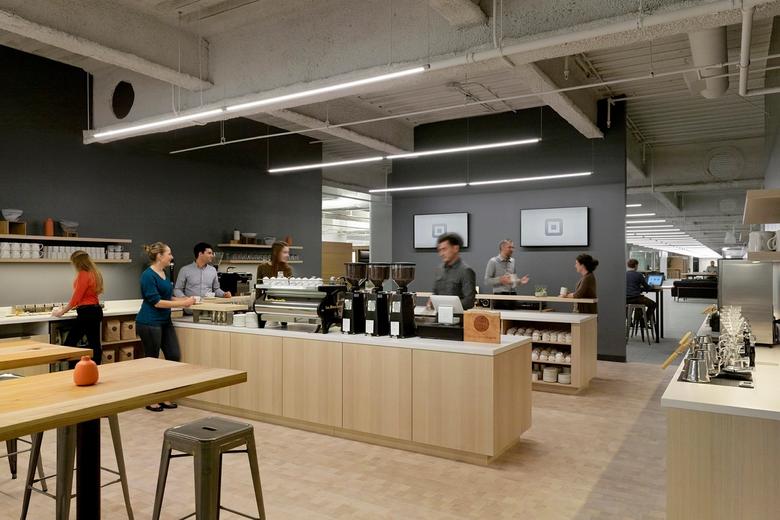
Photo credit: ArchDaily
Square offers a ton of great additional lifestyle perks to its employees:
- A WFH kit with a laptop, monitor, headset, and a $500 stipend to buy anything else you might need for your home office (like a desk, chair, etc.)
- Reimbursement for electricity and internet up to $125 per month
- Working in the office has its perks as well: casual dress attire, free snacks and drinks, and onsite cafes at some locations
- Monthly $75 gym/wellness reimbursement, as well as free on-site fitness classes and wellness events
- Monthly $125 phone bill reimbursement
- Transportation allowance
- Free subscription to LinkedIn Learning
Square Interview Process & Questions

Photo credit: Arc Magazine
Interview Process Specifics
Most people report that the hiring process is lengthy. It typically lasts around two to four weeks and may involve entire days dedicated to interviews. In accordance with its culture of transparency, Square has an entire page on its Careers site dedicated to explaining the interview process. Here's what it looks like:
1. Recruiter Interview
If the hiring manager selects your application, you will first interview with a recruiter. They will ask you general questions about your experience and interest in the company. If your application is moved forward, this recruiter will continue to guide you throughout the interview process.
2. Team Interviews
If you are selected for follow-up interviews, you will meet with the team that your prospective role works with. The team will ask more specific questions about past experience and goals.
3. Projects & Assessments
Interviews at Square also require you to complete an assignment such as a project, case study, or submission of a portfolio of past work. Interviews tend to emphasize collaboration, so you may work with team members when completing an assignment.
How to Prepare
Before your interviews, you should visit Square's interview page to familiarize yourself with its products and services and get to know the company better. On Square's interview page, a recruiter offers this piece of advice for navigating interview questions:
“Use storytelling to show your skills through the S.T.A.R. method: Situation, Task, Action, and Result. Bring forward scenarios you have encountered in your life, professional or personal, that relate with the job you are interviewing for.”
Practice using this method to answer behavioral questions. For more tips on how to do so, check out this article.
Additionally, take the time to learn about the company. When interviewing potential new hires, Square looks for candidates that find its mission inspiring and relate to its core values. If you want to get hired, you'll need to show that you're a cultural fit.
Interview Questions to Practice
Interview questions vary depending on the role. For example, engineers should expect questions about probability, data structures, system design, and coding.
For all roles, you will likely be asked general behavioral questions, especially during the early stages of the interview process. Customer-oriented or less technical roles should be particularly well-prepared for these. Here are some possible behavioral interview questions to expect in any role:
- Why do you want to work at Square?
- What about this job is appealing to you? Why?
- What do you know about Square?
- What is your greatest strength?
- Tell me about a time you had to conduct a project.
- Think of an experience where your team faced a challenge. How did you help resolve that issue?
- Tell me about a time you were given feedback. How did you handle it?
- Describe a situation in which you were not able to communicate effectively with a colleague. What did you do to resolve the miscommunication?
In Conclusion
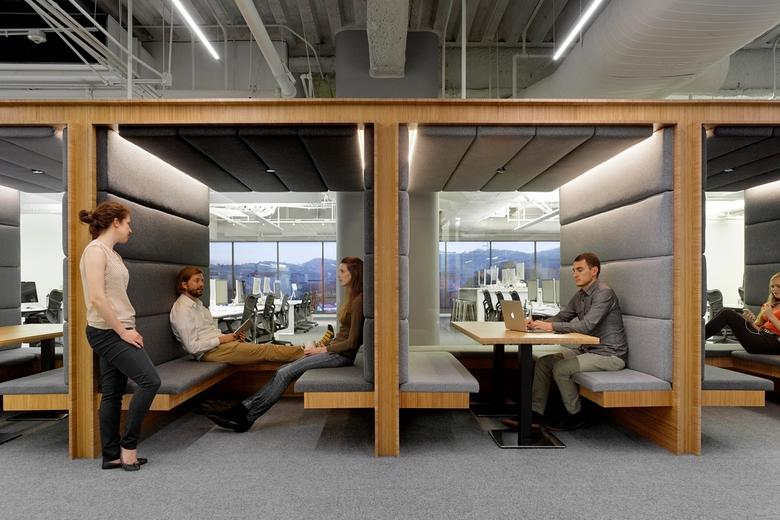
Photo credit: ArchDaily
Despite complaints about long hours and intense work culture in the early years of Square's operation, there seems to have been a complete shift in work-life balance since. Employees in recent years claim that Square offers a lot of flexibility in regard to hours.
Overall, the culture at Square emphasizes community, collaboration, and diversity, making it an ideal environment for anyone who regards these values as important in their search for a potential employer.
The information provided herein is for general informational purposes only and is not intended to provide tax, legal, or investment advice and should not be construed as an offer to sell, a solicitation of an offer to buy, or a recommendation of any security by Candor, its employees and affiliates, or any third-party. Any expressions of opinion or assumptions are for illustrative purposes only and are subject to change without notice. Past performance is not a guarantee of future results and the opinions presented herein should not be viewed as an indicator of future performance. Investing in securities involves risk. Loss of principal is possible.
Third-party data has been obtained from sources we believe to be reliable; however, its accuracy, completeness, or reliability cannot be guaranteed. Candor does not receive compensation to promote or discuss any particular Company; however, Candor, its employees and affiliates, and/or its clients may hold positions in securities of the Companies discussed.
